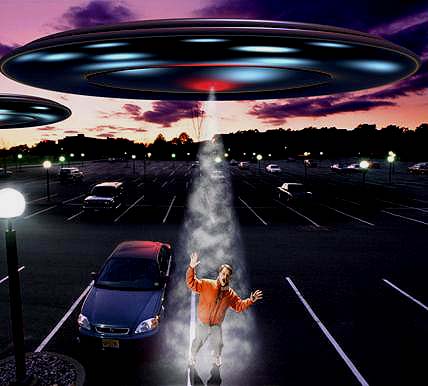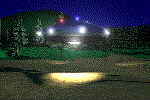
UFOs, 1985–2012
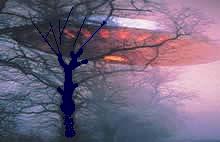
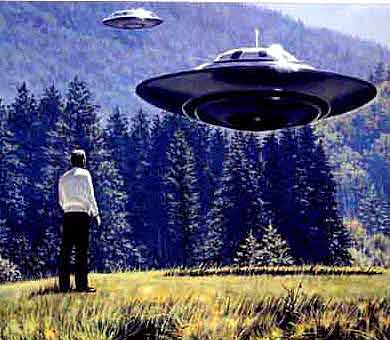
 UFOs, 1985–2012  |
 |
The saga of UFOs and flying saucers from 1947 to 1985 is covered elsewhere on these pages. The only “UFO action” to occur since is a new wave of contactee/abductee UFO books in 1987 followed immediately by the last-to-date of UFO flaps— an increase in “sightings” of “strange” objects in the skies. The increase in contactee/abductee reports is due to the activities of UFO “investigators” such as Budd Hopkins and the late John Mack, who like pied pipers of Hamlin convinced thousands of Americans that their nightmares featuring space aliens were “real” alien abductions. The best-known individual contactees/abductees to emerge during the period were Swiss cult leader Eduard Meier, who modeled himself very closely on George Adamski, the contactee titan of the 1950s; and Whitley Strieber, a supernatural-horror novelist who turned out a series of “nonfiction” books based on his own dream-like abductions by space aliens that seemed more like supernatural beings, and read a lot like his earlier novels. The best-known UFO photographer of the period (apart from Meier, whose photos were taken in the 1970s) was Ed Walters of Gulf Breeze, Florida, whose photos mainly date from 1986 to 1988.
|
Finally, the 1980s
saw the full flowering of the
myth of a
UFO crash at Roswell,
New Mexico,
supposedly back in 1947, but in fact originating in the almost-entirely
fictional
book, The Roswell Incident (1980) by
Charles Berlitz and William Moore. The mythmaking even resulted
in several different
(and inconsistent) hoax films and
photo sequences purporting to show autopsies of
the space alien corpses found at
the imaginary crash site! If you want to make your own autopsy
video tape, North Carolina's Morris Costumes sells a variety of
different small space alien bodies you can use to get started... as the
example at left illustrates. |
Those who confused collecting flying saucer sightings with stamp collecting in the 1960s and 1970s produced huge albums of eyewitness sketches of saucers... there were tens of thousands, no two even vaguely alike. If those were alien space ships there was an incredible amount of customizing going on! In the 1980s and 1990s there were so many “encounters” with space aliens that the eyewitness descriptions of aliens themselves roamed up into the thousands, with no two aliens really alike. There were hundreds of varieties of small, elf-like “greys,” hundreds of varieties of large, thin insect-like “ancients,” hundreds of varieties of tiny, dwarf-like creatures, hundreds of varieties of “reptilians,” like bipedal crocodiles, hundreds of varieties of George-Adamski-style “Nordics,” or Space Brothers, and thousands of quite different, quite weird-looking aliens reported by abductees with more imagination than the rest of the pack.
It's hard to avoid the feeling that, after nearly 65 years of eyewitness “sightings” of sky objects that are anything but unidentifiable, increasingly wild claims, stacks of obviously faked photos, and no evidence of any kind whatsoever emerging of visitation of the earth by Space Aliens, the whole myth is slowly but surely winding down. There have been no widely-publicized UFO photographers since Meier and Walters, contactee/abductee books have long vanished from the stores, and publicized UFO sightings tend to be confined to Third-World countries. However, pseudoscience is entirely a phenomenon of fads. The UFO fad is definitely in partial eclipse right now, but such eclipses have occurred several times before in the past 65 years, and some new “hook” has always been found to bring UFOs back into the rapidly-shifting media spotlight. We shall see.
It's worth discussing the photos of Meier and Walters, since they are all over the Internet, even today, and there is not much rational discussion of them.
These images were allegedly taken with a Polaroid camera. In almost
every case
the flying saucer is very small in the frame, not in focus, and seen
(extremely underexposed)
against the night sky. The saucer looks like a light fixture about a
foot in diameter,
complete with light-source inside. There is sometimes what appears to
be a
reflection
from a string or power cord, right above the saucer. [All the published
images
are supposedly rephotographs of original Polaroid instant-camera
prints.
Many of these prints, as rephotographed, display a vertical scratch
along just the position the supporting
string would occupy, if the scratch were not obscuring it.
Coincidence?] After Walters sold
his old house
and purchased a new one, using profits from a just-published book
featuring
his stories and photos, the new owner found a flying saucer model
looking very
much like the ones shown in Walters' photos, discarded in a closet.
Walters
had several models, because some of his photos show up to three
saucers. Walters' own sketch of his photographed saucer, as
reproduced in his book and below, matches the model found very closely,
but does not match some of Walters' own photos. Walters also made
some video tapes of the saucers, probably inspired by Billy Meier who
in the 1970s made some 8 mm movies of his own saucers.
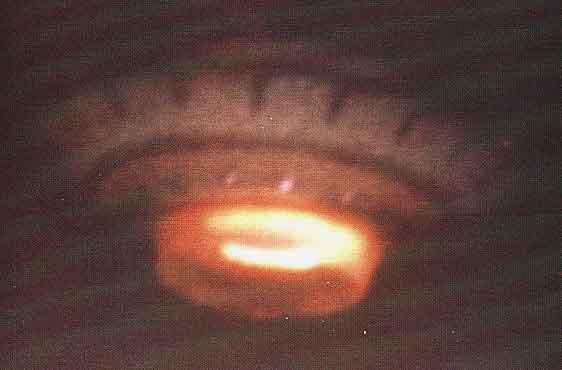 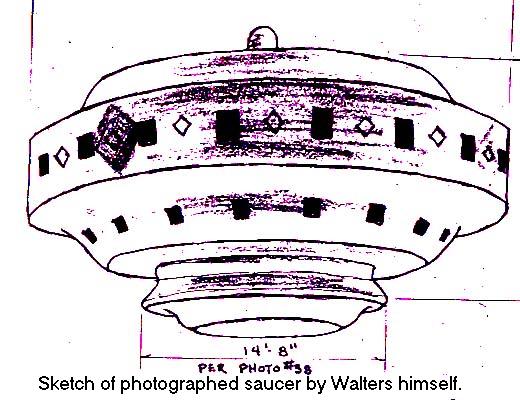 |
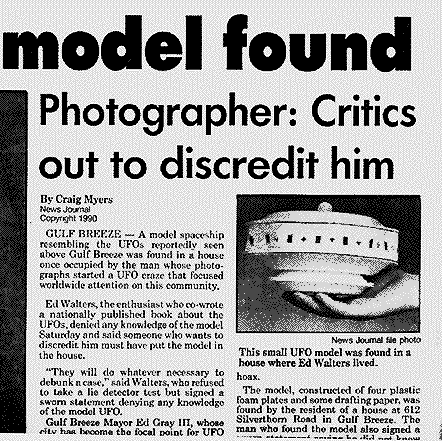 |
Walters' best-known photo shows the saucer, in twilight, apparently hovering over a two-lane road and lighting it up. This is an easy image to achieve if two or more people are involved. One person puts the camera on a tripod, hangs the saucer a few feet in front of it, turns on the saucer's light and locks open the camera shutter. Directed by the man behind the camera, one or two other people walk to the road many feet beyond the camera and saucer, and shine powerful electric lanterns at the spot on the road that, in perspective, appears to be just below the saucer. With the camera shutter still open, the lantern-bearers need to walk around and around in a circle, keeping the beams from the lanterns directed toward the center. A chalk circle on the highway, drawn as directed from the camera, is a help in getting a fairly tight illuminated area. The time exposure produces a smoothed-out circular region of light; for the same reason, moving walkers will never appear in silhouette against the lit area. In taking the photos, Walters sometimes had the help, not only of his wife, but also of his teenage son and two of his son's friends. The idea of having a light “beam” issue from the bottom of the saucer is probably derived from the Billy Meier photos of a decade before. Two of Meier's nine different types of saucers are supposed to have beams of some kind coming straight down out of their bottoms. (See below.)
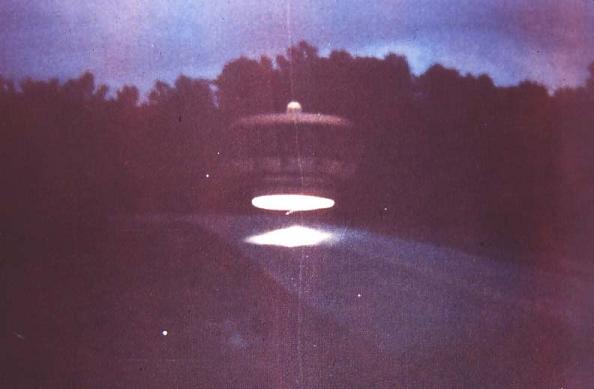
Grumpy physics professors would not be very impressed by such photos, for a number of reasons. (1) The light on the road is optically impossible given the apparent source; it would have to spread out over a broad area instead of size-matching the lit bottom of the saucer. This is about as stupid as showing a light bulb forming an image of itself on the wall, leaving the rest of the room in darkness. (2) The saucer, based on the width of the two-lane road it is directly above, is improbably small unless its crew are the size of housecats. (3) There is no physical mechanism by which a massive object can hover without propulsion; flying saucers love to hover, but no actual object could.
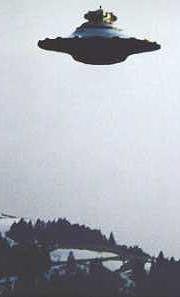 |
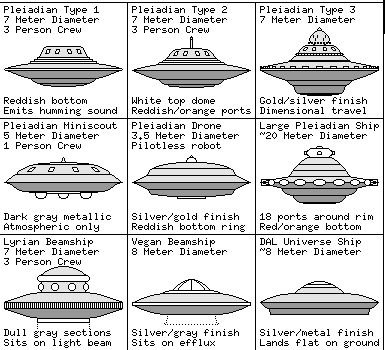 |
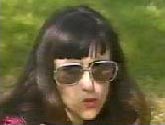 |
With the help of his wife Kalliope, Meier constructed nine different flying saucers (above) using hubcaps and potlids as the basic ingredients. [He was probably remembering his hero George Adamski, whose wild claims of talking telepathically to men from Venus were “supported” by pretty interesting, sharp photos of the Venusian “scout ship.” Adamski's photos don't hold up to a second look, however, because that look reveals no glass in the saucer's “portholes,” and the reflection of two to three floodlights on the saucer's smooth surfaces, although the photos were supposedly taken outdoors.] |
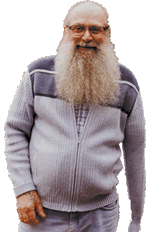 |
Over a period of about a year beginning in 1975, Billy and Kalliope went out and photographed the models. One innovation, later imitated closely by Walters, was to hang two or more saucers from the bare, outer limbs of a tree, then walk around to the other side and take some shots. It was supposed to look as if the saucers were behind the tree, far in the distance. It doesn't. Then Meier came up with his best-known shots. He got a miniature tree, the kind made for model railroad layouts, and taped it to the rim of one of his saucers. Taking photos from various directions, he created the impression that the saucer was orbiting the tree in a tight circle. The problem is that enough of the background landscape is shown in the photos to identify precisely the location where the photos were shot, and there is no actual tree in the spot shown! Meier later invented a number of inconsistent stories to cover this very slight difficulty. At one time he said the spacemen were very interested in the tree for some reason and took it away with them. Another time, he said they loaned him a real Buck Rogers disintegrating pistol and he tried it out on the tree, disintegrating it without a trace! In the photos, the “tree” looks like a conical brush, and nothing like any known species of tree. After Kalliope and Meier divorced, she gave away a number of UFO-photography secrets, but most of them are obvious to nearly anyone upon inspection of the photos. Meier is obviously proud of his UFO models, and keeps them on a shelf in his office in the religious commune he leads as guru and prophet. Billy's cult has the somewhat bizarre name of FIGU (Freie Interessengemeinschaft für Grenz- und Geisteswissenschaften und Ufologiestudien). Sounds like the name should have been FIGG-U, and maybe that's a hidden message from the space aliens. The glue that holds the cult together is not Meier's 36-year-old photos but the weekly spiritual revelations he “channels” from space alien buddies such as Sfath, Semjase and Ptaah. Ptrish, Ptracy and Ptiffany have yet to turn up.
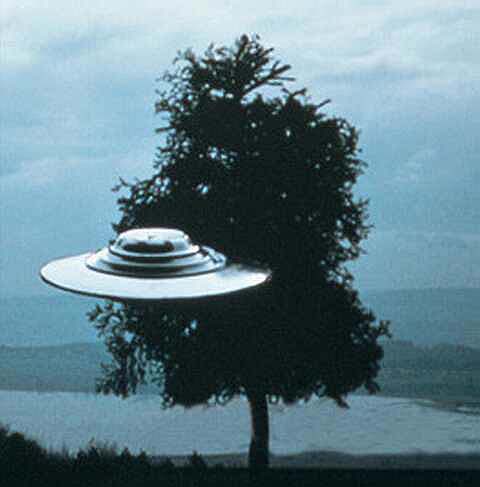
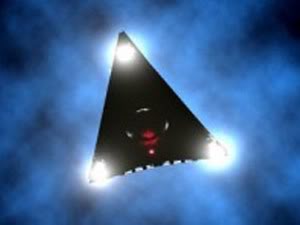 |
Styles in UFO photos come and go. One of the more popular “themes” since 1990 has been the triangular UFO, which can have a light at each vertex, a light in the center only, or a light in the center and the three vertices. The triangle is either black or always seen in silhouette, and every photo I have seen to date, without exception, is an obvious fabricated model. One UFO enthusiast says he made one out of cardboard in less than 10 minutes. |
The other main theme of 1980s and 1990s UFOlogy dates all the way back to the 1960s and Betty Hill— being abducted by aliens, examined, and released. Budd Hopkins and John Mack elicited thousands of UFO abduction tales, basically by inviting people to tell them of their dreams and nightmares.
| Mack, in particular, was not bothered by the fact that the tales were obviously dreams, having all the standard nonlinear, discontinuous, nonphysical features of dreams. He wrote, “When abductees call their experiences dreams, which they often do, close questioning can elicit that this may be a euphemism to cover what they are sure cannot be [dreams], namely an event from which there was no awakening, that occurred in another dimension.” [My italics.] So Mack was led to the inevitable pseudoscientific conclusion, that the “space” aliens actually came from parallel worlds, coexistent worlds, other dimensions, and other science-fictional scenario realms without any counterpart whatsoever in our actual universe. Many observers have noted that a surprising majority of abductee reports tend to be slight retellings of incidents from the 1953 film Invaders from Mars. |
Links—
